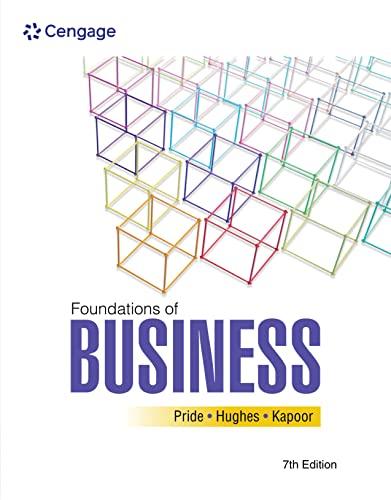Sweetgreen, a farm-to-table salad chain, combines mission and passion to build healthier communities by connecting people to
Question:
Sweetgreen, a farm-to-table salad chain, combines mission and passion to build healthier communities by connecting people to real food. The company is revolutionizing the salad business. Jonathan Neman, Nicolas Jammet, and Nathaniel Ru, who met in an entrepreneurship class at Georgetown University, set out to create healthy meals made from locally sourced ingredients. After raising $300,000 from 40 investors, Sweetgreen was born in 2007.
Neman says the founders’ lack of experience in the restaurant industry contributed to their success because they were able to enter it with a fresh perspective. One of their earliest challenges was learning how to lead and effectively turn problems into growth opportunities. Sweetgreen created a safe space for innovation and experimentation through its structure and goals. Managers monitor objectives and key results (OKRs). OKR is a collaborative goal-setting framework used to define and track objectives and their outcomes with measurable results. The company has a so-called learning forward document to keep track of failures and learnings from those failed endeavors.
Sweetgreen’s leadership team also strives to foster a culture of gratitude. Monthly, team members write gratitude cards to employees and customers. According to Neman, “culture really does eat strategy for breakfast.” Strategy shifts and products change, but a strong, unwavering organizational culture is the foundation of the company. Their leadership style is not static, but evolves as the restaurant chain grows. Today, Sweetgreen enjoys a loyal following at more than 100 locations in ten states as well as Washington, DC.
The distribution element of Sweetgreen’s marketing mix is perhaps the most compelling. The company has built an entire food ecosystem that elevates Sweetgreen from fastcasual restaurant to food platform. Sweetgreen has worked to digitize its business from start to finish, and now more than half of its orders originate on the Sweetgreen app. The salad chain also has an Outpost program that offers complimentary delivery to employees of participating companies. Employees order their meals in the morning, and they are delivered to a set drop point in select office buildings in the afternoon.
Additionally, blockchain—a secure digital ledger for recording information—has been integrated into the salad start-up’s supply chain, allowing it to trace its fresh fruits and vegetables from farm to table. Initially, Sweetgreen used the technology to research best times for harvesting and eating produce but expanded it to improve traceability and food safety.
Sweetgreen is also known for its seasonal dishes and often works with high-profile chefs such as Nancy Silverton. For example, Sweetgreen purchased Koginut squash seeds from Row 7 Seed Company, which develops seeds for produce, and gifted the seeds to farming partners across the country.
Sweetgreen purchased the resulting Koginut squash and sold it in a limited-time-only entree nationwide. The company announced the dish’s arrival with a billboard in Times Square.
Jammet says the company likes to “look outside the food world” to find inspiration for its promotion strategy.
The company’s focus on health, wellness, and sustainable practices resonates with its core customer group:
young professionals who put their money where their values are. Sweetgreen’s corporate culture and marketing strategy have made its salads stand out in a category that often feels unexciting. The company has a modern supply chain, local supply chain partners, a focus on sustainability, consistent storytelling, and a popular app and loyalty program. Though it has attracted criticism for its products’ high price tags, Sweetgreen pays it forward by increasing employee wages and benefits. The company, which has been valued at more than $1 billion, has experienced profitable growth. With cash from eager investors lining its pockets, Sweetgreen is poised to take off across the country.
Questions
1. How has blockchain technology improve Sweetgreen’s supply chain?
2. Describe the organizational culture at Sweetgreen.
3. How does management at Sweetgreen track objectives and their outcomes?
Step by Step Answer:

Foundations Of Business
ISBN: 9780357717943
7th Edition
Authors: William M. Pride, Robert J. Hughes, Jack R. Kapoor





